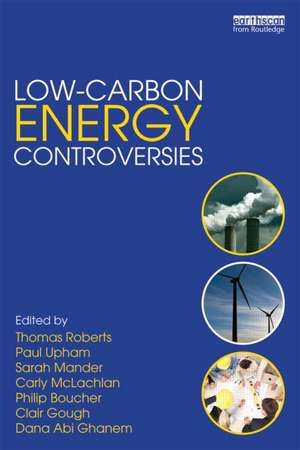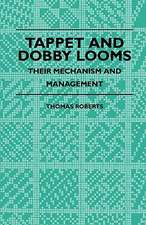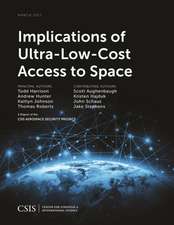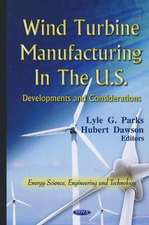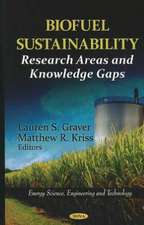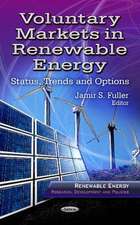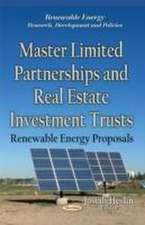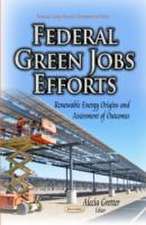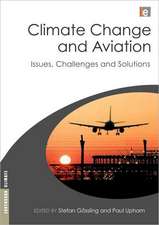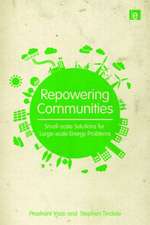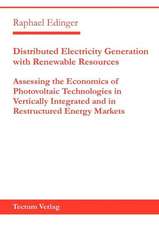Low-Carbon Energy Controversies
Editat de Thomas Roberts, Paul Upham, Sarah Mander, Carly McLachlan, Philip Boucher, Clair Gough, Dana Abi Ghanemen Limba Engleză Hardback – 19 noi 2012
This books brings together ten years of research conducted by the Tyndall Centre for Climate Change Research and uses a range of case studies from carbon capture and storage to on-shore wind farms to explore the complex nature of disputes between a wide variety of stakeholder groups. Topics covered include:
- the importance of context
- the relationship between risk and trust
- sense of place
- role of the media
Preț: 766.12 lei
Preț vechi: 1103.92 lei
-31% Nou
Puncte Express: 1149
Preț estimativ în valută:
146.64€ • 159.34$ • 123.26£
146.64€ • 159.34$ • 123.26£
Carte tipărită la comandă
Livrare economică 21 aprilie-05 mai
Preluare comenzi: 021 569.72.76
Specificații
ISBN-13: 9780415502627
ISBN-10: 0415502624
Pagini: 288
Ilustrații: 10 b/w images, 11 tables and 2 halftones
Dimensiuni: 156 x 234 x 23 mm
Greutate: 0.56 kg
Ediția:New.
Editura: Taylor & Francis
Colecția Routledge
Locul publicării:Oxford, United Kingdom
ISBN-10: 0415502624
Pagini: 288
Ilustrații: 10 b/w images, 11 tables and 2 halftones
Dimensiuni: 156 x 234 x 23 mm
Greutate: 0.56 kg
Ediția:New.
Editura: Taylor & Francis
Colecția Routledge
Locul publicării:Oxford, United Kingdom
Public țintă
Postgraduate, Professional, and Professional Practice & DevelopmentCuprins
1. Introduction: Understanding and Triangulating Approaches to Energy Supply Controversy 2. Public Responses to Climate Change and Low-carbon Energy 3. Methodologies for Understanding Low-carbon Energy Controversies 4. Exploring the Relationship Between Public Perceptions of Risk and Trust in Experts 5. What Have Facts Got to Do With it Anyway?: Competing Knowledge Claims in Low-carbon Energy Controversy Carly McLachlan and Sarah Mander 6. Energy Siting Governance: Social and Political Challenges Associated with the Development of Low-carbon Energy in the Marine Environment 7. Microgeneration in the Built Environment: Meanings and Processes of Solar Photovoltaic Technology 8. Policy and Regulatory Controversy: The Case of UK and EC Biofuel Policy 9. Biofuel Development in the UK regulatory and Engineering Visions Beyond a Changing Controversy 10. Public Engagement in Energy Planning and Its Impact on Low-carbon Energy Controversy 11. New Energy Technologies in the Media: a Case Study of Carbon Capture and Storage 12. Conclusions and a Research Agenda for the Social Science of Energy Supply
Descriere
Governments, big business and communities are coming under increased pressure to develop low carbon energy supply technologies. However, public opposition to the development of the siting and implementation of the technology associated infrastructure often complicates progress. This is sometimes labelled the ‘not in my backyard’ or NIMBY attitude – an unhelpful tag as conflicts over new development between governments, local authorities, business and communities are generally far more complex than NIMBY theory implies. Furthermore, within the context of the climate change debate a delicate balance has to be reached between local environmental protection and our need for reliable low carbon energy.
This comprehensive book builds on over 10 years of research conducted by the Tyndall Centre for Climate Change Research and uses a range of case studies from carbon capture and storage to on-shore wind farms to explore the complex nature of disputes between a wide variety of stakeholder groups. Topics covered include the importance of context, the relationship between risk and trust, sense of place and the role of the media. An invaluable resource for researchers and readers in local or national government, industry or community groups who wish to deepen their understanding of controversy around low carbon technology and how to overcome it.
This comprehensive book builds on over 10 years of research conducted by the Tyndall Centre for Climate Change Research and uses a range of case studies from carbon capture and storage to on-shore wind farms to explore the complex nature of disputes between a wide variety of stakeholder groups. Topics covered include the importance of context, the relationship between risk and trust, sense of place and the role of the media. An invaluable resource for researchers and readers in local or national government, industry or community groups who wish to deepen their understanding of controversy around low carbon technology and how to overcome it.
